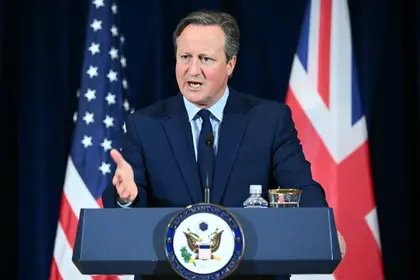British Foreign Secretary David Cameron pleaded Tuesday for US Republicans to approve billions of dollars in military support for Ukraine as he made his case directly to Donald Trump.
The former Conservative prime minister had dinner Monday with Trump, the ex-president and Republican challenger to Joe Biden in November, at his Florida estate before heading to Washington.
JOIN US ON TELEGRAM
Follow our coverage of the war on the @Kyivpost_official.
Speaking the next day alongside Biden's top diplomat Antony Blinken, Cameron described his meeting with Trump as "private" but said he raised issues including "the future of NATO," the Western alliance which the Republican mogul has often criticized as unfair to the United States.
Cameron later met US lawmakers but was unable to see the key Republican in the aid holdup, House Speaker Mike Johnson, who for months has resisted calling a vote on Biden's request for some $60 billion in new assistance to Ukraine.
"I come here with no intention to lecture anybody, or tell anybody what to do or get in the way of the process of politics," Cameron said.
"I just come here as a great friend and believer in this country, and a believer that it's profoundly in your interest," he said, "to release this money."
"There will be people in Tehran, in Pyongyang, in Beijing, looking at how we stand by our allies, how we help them, how we stop this illegal and unprovoked aggression, and working out whether we are committed," he said.

What if Russia Wins?
Blinken said it was "imperative" for the House of Representatives to act now that it is back in session.
- 'Entirely proper' -
Cameron, in a memoir after leaving Downing Street, voiced alarm over the "protectionist, xenophobic, misogynistic" style of Trump.
But he said it was "entirely proper" to meet Trump on Monday.
Cameron pointed to a long history of US and British leaders holding talks with political candidates, including Blinken meeting in February with British opposition leader Keir Starmer.
Trump, however, has largely met illiberal foreign leaders while out of office, welcoming Hungarian Prime Minister Viktor Orban in Florida last month.
The Trump campaign said that he and Cameron discussed "the upcoming US and UK elections, policy matters specific to Brexit, the need for NATO countries to meet their defense spending requirements and ending the killing in Ukraine."
Trump has voiced skepticism about aid to Ukraine and sought to link the debate to his signature issue of cracking down on migrants.
He has also boasted that he could quickly broker an end to the war in Ukraine as president, a sharp contrast from Biden's vow to support Kyiv for as long as it takes.
Ukrainian President Volodymyr Zelensky has rejected calls to surrender territory to Russia as part of any peace deal, including Crimea, which Moscow seized in 2014.
Ukraine has warned that it risks losing ground and is rationing ammunition as Russia, sensing an advantage more than two years into its invasion, ramps up attacks.
UK government sources said Cameron was unable to meet Johnson due to scheduling issues.
Johnson leads a razor-thin Republican majority and could face the wrath of far-right lawmakers over any compromises, such as working with Democrats to pass the aid.
He said last month he was looking at a "number of avenues" on Ukraine aid, which has already been approved by the Senate, controlled by Biden's Democratic Party.
In another pressure bid, Mike Pompeo, Blinken's predecessor under Trump, co-wrote a letter to Johnson supporting approval of aid.
"Ukraine is fighting for its survival against an expansionist Russia that despises and contests the West. Without a single US or NATO soldier firing a shot, Ukraine has caused Russia to suffer losses of manpower and equipment it has not seen since World War II," said the letter by Pompeo and John Walters, president and CEO of the conservative Hudson Institute.
You can also highlight the text and press Ctrl + Enter






